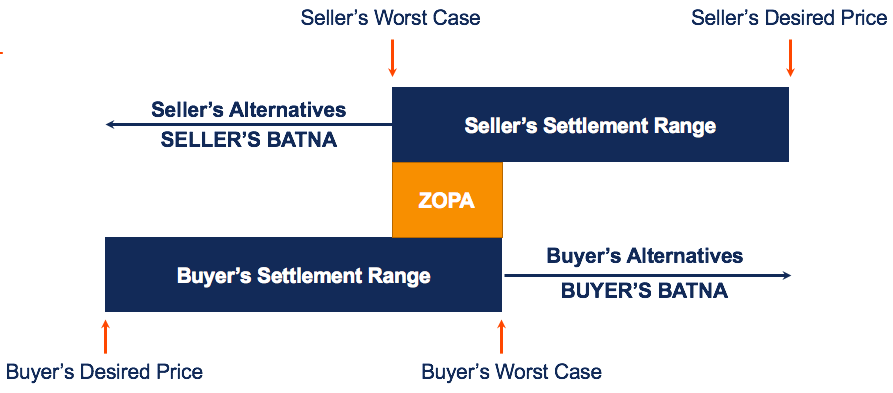In a world where negotiations can make or break a deal, mastering your contract negotiation skills is the move you’ve been searching for, to tip the balance in your favor. This is precisely what this blog is here to do—help you negotiate SaaS contracts and all kinds of business deals like a pro. Negotiating goes beyond words.
When you’re discussing the terms of a contract or deal, you want to foster a healthy business relationship, get the best outcome for your organization, and mitigate potential conflicts. This guide walks you through five contract negotiation strategies, like BATNA (Best Alternative to a Negotiated Agreement), to turn obstacles into opportunities.
1. Preparing for contract negotiations
Conduct thorough research
Carrying out exhaustive research allows you to identify opportunities and mitigate potential risks. Never enter a negotiation room without it. Research lets you appreciate your counterpart’s business model, sector, values, culture, and market position. Thorough research can paint a picture of their priorities, struggles, and opportunities. You can tailor your offers and responses to resonate with their core interest.
Look into your prospect’s past deal announcements, performance, and reactions to previous negotiations. How did previous negotiations play out? What were their sticking points? What offers were they quick to accept?
Set clear objectives
Clear goals help to manage your negotiation process, make decisions, and keep your eyes fixed on what really matters. In other words, what your minimum acceptable outcome can be. Knowing your range is integral to measuring against what the other party offers and when it’s necessary to walk away.
One way to specify your contract negotiation objectives is to list out what the deal should accomplish for your company. Be it profit-driven, expanding your business network, securing long-term engagement, or breaking into a new market segment—set your goals and align them with your overall business objectives.
2. Effective communication in contract negotiations
Rolling off the preparation for contract negotiations, strong communication now becomes the core tool for contract negotiations. We’ll dissect this into two clear facets, active listening and assertive communication.
Active Listening
It serves as a hidden weapon while negotiating contracts. It enables you to fully understand and analyze the other party’s proposals, expectations, and apprehensions. In active listening, you hear the words and pick up non-verbal cues. These include tone variations, inflections, timing, and the frequency of talking points. Recognizing these nuanced indicators provides insights into the speaker’s genuine thoughts and feelings.
Assertive Communication
The key to assertive communication is based on the clear conveyance of your needs, expectations, and boundaries without disrespecting or invalidating the other party’s stance. Additionally, assertive communication is defined as expressing complex ideas in simple, precise terms. Jargon and long-winded explanations may lead to confusion or misinterpretation. Stick with straightforward language and short sentences for maximum comprehension.
3. Understanding contract terms and conditions
To excel in contract negotiation, a clear understanding of the contract’s terms and conditions, industry-specific language, and compliance requirements is indispensable. It’s a detailed and complex process, but acknowledging its importance—in particular, dedicating time to comprehending legal complexities—can contribute to a positive negotiation.
Decoding legal jargon
The language of contract terms, conditions, and industry-specific terminologies is key to grasping the context and goal of a contractual agreement. Mastering these terminologies allows you to find possible constraints, operational complications, and even hidden opportunities within the contract.
Evaluation of stipulations
Keen observation skills are valuable when reviewing various contract clauses and stipulations. As a result, its worth trying to interpret provisions related to penalties, liabilities, indemnities, payment terms, and so forth. These points, when understood accurately, can tremendously benefit your negotiation strategies.
Compliance with industry regulations
Negotiating a solid contract isn’t just about what your organization desires. It’s also about complying with existing business laws, environmental regulations, and/or data privacy laws applicable to your sector. In-depth knowledge of these regulatory requirements will provide a robust base for negotiations and ensure that both parties operate within legal confines and avoid potential pitfalls.
For further insights, check out Superlegal’s Top 3 NDA Negotiation Killers you should be aware of.
4. Leveraging BATNA in contract negotiations

Source: Corporate Finance Institute
Getting back to the negotiating table isn’t always about possessing a superior product or service. Oftentimes, you can identify and leverage your BATNA (Best Alternative To Negotiated Agreement) that nudges the bargaining power in your favor. Here are some pointers you need about how to negotiate a contract with BATNA:
- Building BATNA can tilt the negotiation scales in your favor
- It provides a safety net if negotiations fall apart
- A strong BATNA can deliver superior negotiation outcomes
Establishing your BATNA
Your first step should be to research available options to develop a powerful BATNA. If your organization deals in software services, which is one of our favorite contract negotiation examples, your BATNA might be turning to another potential client who values your services. In this case, if your present negotiation doesn’t yield favorable terms, you’ll have an alternative path to consider.
Strengthening your BATNA
This involves refining your alternatives and diversifying your options. Regular market analysis and continual assessment of alternatives can enhance negotiation power. If you have multiple beneficial alternatives at hand, your position at the negotiation table becomes that much stronger. Implementing a strong BATNA is a nuanced process that requires continual refinement, but it pays off.
5. Leverage the power of concessions
Negotiation often involves give-and-take. One effective strategy is to use concessions strategically. If you need to concede on a particular point, make sure you’re getting something valuable in return. For example, let’s say the other party insists on a shorter payment term than you’d like, you might agree to it in exchange for a price reduction or better delivery terms. This approach maintains a balanced contract while demonstrating your willingness to collaborate.
6. Focus on win-win solutions
Rather than approaching negotiation as a zero-sum game, aim for a win-win where both parties benefit. This mindset encourages cooperation and creativity. Imagine you’re negotiating a service contract and the other party is concerned about pricing terms, you might suggest a performance-based payment structure that aligns costs with results. This way, both sides have an incentive to succeed, fostering a healthy partnership rather than an adversarial relationship.
7. Know when to walk away
Despite your best efforts, not all negotiations will end in an agreement that works for you. It’s important to recognize when the terms being offered are too risky/unfair to accept. Knowing your limits and being prepared to walk away from a bad deal is a powerful negotiation tool. It shows the other party that you’re serious about protecting your interests and won’t settle for unfavorable terms. Sometimes, the willingness to walk away may lead to the other party making more concessions.
8. Post-negotiation contract review
Successful contract negotiations don’t end at signing. In fact, post-negotiation reviews can be the launching point for continuous learning and future negotiation preparation. That’s why we conduct a quality post-negotiation review to address essential specifics like contract fulfillment, involved parties’ satisfaction, and lessons for future negotiations.
Here’s how we go about post-negotiation review.
Review the negotiation process
Revisit the negotiation starting from the preparation stage to implementation. Check your own performance against the set negotiation objectives. What went wrong? What went right?
Reflect on the outcomes
Analyze the areas that showed successful results and those that unfortunately didn’t meet the standards. Don’t leave this goldmine unexplored, as you can learn new and unexpected details that can inform your future actions and strategies.
Learn and document
The final step is learning from these evaluations. Document the lessons learned and strategize for future negotiations. The gained insights become useful to improve and avoid repeating mistakes.
Negotiate business contracts with a contract automation platform
Before entering any negotiation, you’ll want to assess the context thoroughly—historical data, market trends, competitor practices, possible legal considerations, and other relevant aspects. While the inherent nature of negotiation can seem competitive, it often yields greater results when approached collaboratively. Win-win or “mutual gains” negotiations rely on both parties’ willingness to seek mutually beneficial agreements.
To level up any of your contract negotiation strategies, consider incorporating AI contract review software into your toolkit. With up to two contract reviews per month starting at just $399, Superlegal revolutionizes your approach to contracts. Take the opportunity to transform contract talks into networks of shared goals. Try it for free.
You see, successful contract negotiations hinge on data-backed knowledge, strategic patience, building trust, leveraging alternatives, and clear communication. These form the spine of successful negotiations. Putting these methods to use can turn dreaded contract talks into networks of dealings and shared goals.
Implement these contract negotiation tips into your routine and improve your negotiation power. Become a stronger deal-closer by working with these methods, and turn the tide of future negotiations in your favor. Remember, as you apply these skills, let every win and loss be a stepping stone to your rise. Above all, always negotiate with integrity.







By entering your email, you agree to our Terms & Conditions and Privacy Policy.